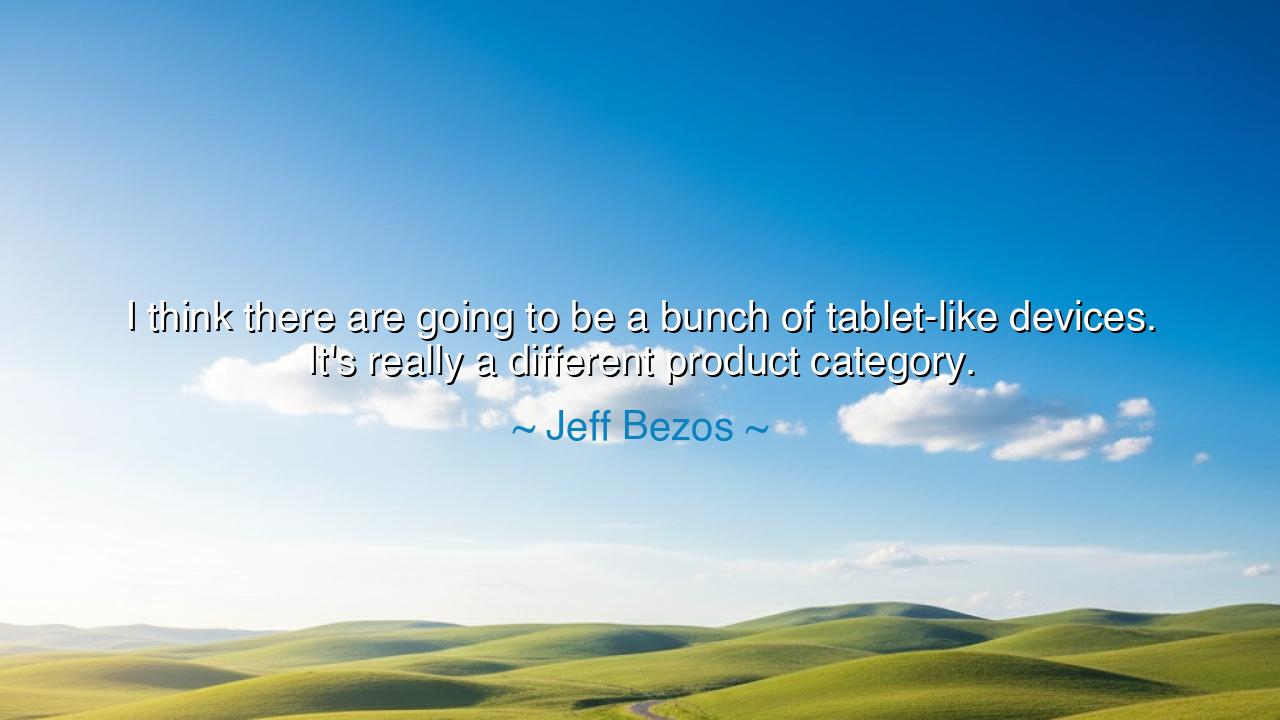
I think there are going to be a bunch of tablet-like devices.
I think there are going to be a bunch of tablet-like devices. It's really a different product category.






When Jeff Bezos spoke the words, “I think there are going to be a bunch of tablet-like devices. It’s really a different product category,” he was not merely making a prediction about technology. He was declaring the dawn of a new age. His words echo with the foresight of one who gazes across the river of time and sees lands not yet mapped, vessels not yet built. The tablet was not just a device—it was a vessel for knowledge, a tool for connection, and a harbinger of how humanity would reshape its bond with information.
Consider the ancients who first carved symbols into clay tablets. Those blocks of earth, heavy and fragile, carried the seeds of law, commerce, and story. Ages later, paper scrolls unfurled to hold the wisdom of empires. And in Bezos’s vision, the tablet-like device becomes the new tablet of destiny, no longer bound by stone or ink, but flowing with the light of countless words, images, and voices. He saw that this was not merely an improved tool—it was “a different product category,” a new species of artifact that alters the very rhythm of civilization.
In these words lies the spirit of disruption. For each age births not only better tools but wholly different kinds of tools. The wheel was not just a smoother stone, but a revolution in transport. The printing press was not just faster handwriting, but the unleashing of literacy. And so the tablet device was not merely a smaller computer, but a fresh realm—portable, intimate, both book and window, both mirror and beacon. To name it “different” was to honor its uniqueness, as one would honor a new star born in the heavens.
History teaches us the fate of those who failed to see such new categories. Think of Kodak, who once commanded the world of film. When digital photography emerged, they treated it as a mere extension of their trade, not as a different category with its own path and power. Their empire, built on the silver crystals of film, crumbled because they could not see that the future was not a better camera, but an entirely new way of capturing life. Bezos, in contrast, understood that the tablet would be to the book what the fire was to the hearth—transformative, not supplementary.
And yet, his words carry not only foresight but warning. For the human heart is often afraid of the new. We cling to what is known, what is comfortable, what has already given us success. But the wise must learn to ask: Is this merely an evolution, or is it a revolution? Is this an improvement, or is this a new birth? To answer wrongly is to risk being left behind, staring at the remnants of a vanished world.
Therefore, O seeker of wisdom, let this saying of Bezos be a teaching unto you. When you encounter the unknown, do not dismiss it as a small variation of the familiar. Look deeper, and ask whether it is a new category of being. Just as the first sailors saw beyond the horizon and believed there were other lands, so too must you recognize when a creation does not fit within old boxes, but demands a new one. This recognition is the difference between stagnation and glory.
The lesson is clear: Embrace innovation not as an improvement of the old, but as the birth of the new. Do not fear the strangeness of new categories, for within them lies the promise of new destinies. In your life, when confronted with ideas, opportunities, or people who do not fit the molds you have known, resist the urge to force them into old categories. Instead, honor their uniqueness, and see what new path may be forged.
And so, child of tomorrow, take this teaching to heart. The tablet that Bezos foresaw is but one sign among many. More such births shall come. Do not wait passively for them. Train your eyes to see them early, and your heart to accept them quickly. In your craft, your work, your relationships—when you encounter the different, do not ask, “How does this fit what I know?” Ask instead, “What new world does this open?” In that question lies the key to thriving in the eternal unfolding of time.






AAdministratorAdministrator
Welcome, honored guests. Please leave a comment, we will respond soon